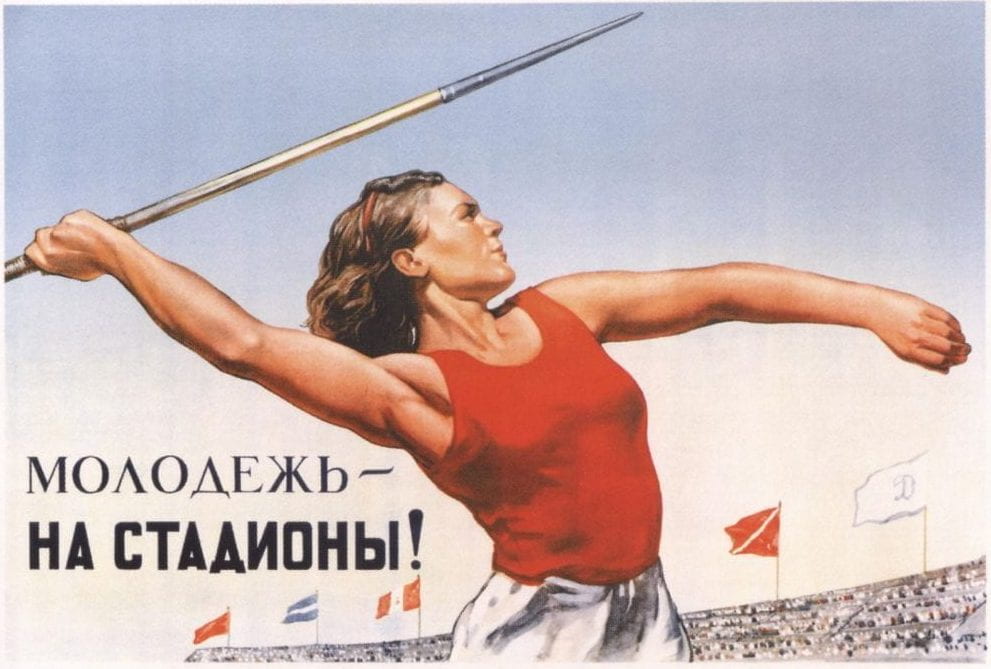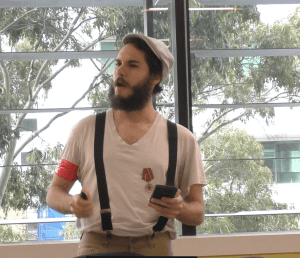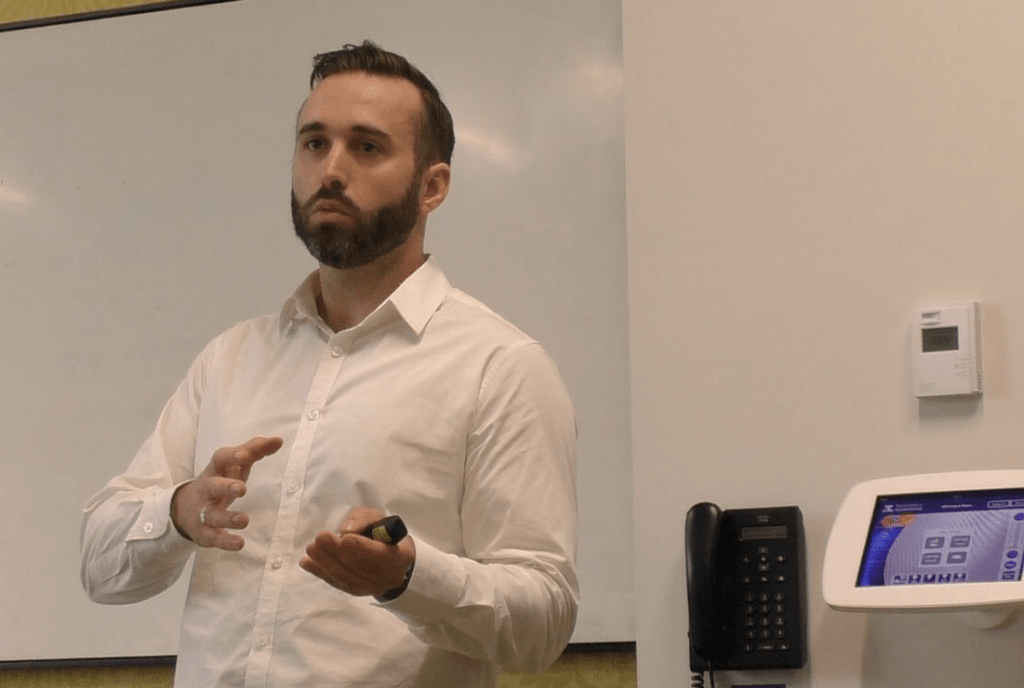
Russian History Returns to Melbourne
From second semester 2019, undergraduates at the University of Melbourne will be able to study Soviet history, with the launch of the second-year subject ‘Red Empire: The Soviet Union and After’. This brand-new subject is part of the History program’s curriculum revamp, led by Hansen Chair Professor Mark Edele. It also marks a revitalisation of Russian studies at the University of Melbourne.
Thanks to appointments made in recent years, we now have two historians of the Soviet Union and Russia in the History program: Professor Mark Edele and Dr Julie Fedor. Both are internationally trained historians who bring experience teaching at leading universities in Europe and the United States, and a deep engagement with Russia’s past and present. They will be co-teaching ‘Red Empire’, together with Dr Oleg Beyda, who recently completed his PhD at the University of New South Wales, Canberra.
Students taking this subject will be immersed in artefacts from one of the biggest social experiments in world history: the Russian Revolution and the subsequent decades of Soviet power. We will trace this history through to the equally dramatic collapse of the Soviet regime and its aftermath. Our focus will be on training students to work with historical evidence, and we will be analysing a wide range of sources, from films to propaganda posters to archival sources, from novels to newspapers. No knowledge of Russian is required, although students of Russian language are also more than welcome to sign up for the subject and will be provided with the opportunity to work with original-language sources should they wish to try their hand at doing so.
At this juncture, looking ahead to the relaunching of Russian history, it’s a good moment to take a look back at some of the highlights of the history of Russian history and Russian studies at the University of Melbourne.
A Brief Survey of the History of Russian History @ Melbourne
Russian history enthusiasts are sometimes surprised to learn that two of the world’s most distinguished historians in the field, Professors Sheila Fitzpatrick and Katerina Clark, are both Australian. In fact, both also received their undergraduate degrees from the University of Melbourne before going on to stellar careers that have taken them around the world, with both spending most of their careers based at universities in the United States. Professor T. H. (Harry) Rigby, leading Australian academic on Soviet politics and political history, was also trained at Melbourne.
The first lecturer in Russian history at Melbourne was S. T. Leung, who taught Russian and Chinese history. When he left in 1985, his position was split into two – one in Chinese history, initially filled jointly by John Fitzgerald and Antonia Finnane, and the other in Russian history, received by Stephen Wheatcroft. Stephen Wheatcroft came to Melbourne from the University of Birmingham’s Centre for Russian and East European Studies, where he had trained under Professor R. W. Davies. At that time, Davies was collaborating with E. H. Carr on his 14-volume history of the Bolshevik Revolution. Wheatcroft has continued to work with R. W. Davies, whose seven-volume History of Soviet Industrialisation was completed last year.
Russian language has been taught at the University of Melbourne since 1946. The Department of Russian Language and Literature was founded by Nina Christesen; she won the post over former Russian Provisional Government leader Aleksandr Kerensky, who also applied for the job (Kerensky had married an Australian woman, Lydia Ellen Tritton, and was living with her in Brisbane at the time). Nina Christesen was born in St Petersburg in 1911; in 1917, her family emigrated to Australia via Kharbin.
During the Cold War, Nina Christesen fought off ideological attacks on the Russian department; she and her husband Clem (founding editor of Meanjin journal) were both called to give evidence at the Royal Commission into Espionage after the ‘Petrov Affair’ of 1954–1955. Nina Christesen was also founding editor of the journal Melbourne Slavonic Studies (1967–1985), later renamed Australian Slavonic and East European Studies (ASEES) Journal, the journal of the Australian and New Zealand Slavists’ Association (founded 1967), and the Australasian Association for Communist and Post-communist Studies (AACaPS), formerly the Australasian Association for the Study of the Socialist Countries (founded 1975 by T. H. Rigby). ASEES is currently edited by Dr Robert Lagerberg.
The University of Melbourne Archives holds extensive collections of materials related to both of the Christesens. Nina Christesen’s personal archive has yet to be studied in detail, but could potentially make excellent material for an Honours or postgraduate student with a reading knowledge of Russian.
The Gorbachev-era reforms of the late 1980s ushered in a new wave of interest in the Soviet Union, and in 1989 historian Professor Stephen Wheatcroft founded what became a thriving interdisciplinary Centre for Soviet and East European Studies (later, the Centre for Russian and Euro-Asian Studies), housed in a Victorian terrace house at 135–137 Barry Street, Carlton. In those times of dramatic transformation of the region, the Centre hosted visits from leading politicians and activists, including Boris Nemtsov, Egor Gaidar, Grigorii Yavlinskii, Adam Michnik, Leszek Balcerowicz, and others. The Centre was formally opened by the Soviet Prime Minister Nikolai Ryzhkov. Other visitors included General Lobov (Commander-in-Chief of the Warsaw Pact forces, whose visit to Melbourne took place in the midst of their dissolution – in fact, he came to Melbourne after leaving Berlin, before heading back to Moscow); Academician Vladimir Tikhonov, deputy head of the Soviet Academy of Agricultural Sciences and leader of the cooperative movement in the early days of Gorbachev’s reforms, before privatisation was possible; and Georgii Matiukhin, President of the State Bank of the RSFSR.
During this period, students at the University of Melbourne could study Russian history (Professor Stephen Wheatcroft); Russian politics (Professor Leslie Holmes, Dr Peter Shearman); Russian literature (Professor Judy Armstrong); Russian economics (Dr Gennadii Kazakevich); and various aspects of Russian language and linguistics, including subjects in Old Church Slavonic (Professor Paul Cubberley). A number of the postgrads attached to the Centre and/or supervised by Stephen Wheatcroft, Leslie Holmes and others have gone on to pursue academic careers: Professor Shahram Akbarzadeh (Deakin University); Associate Professor Stefan Auer (Hong Kong); Dr Greg Dolgopolov (UNSW); Dr Julie Fedor (Melbourne); Dr Emma Gilligan (Indiana University); Dr Robert Horvath (La Trobe University); Dr Bobo Lo (Lowy Institute); and Dr Filip Slaveski (Deakin University).
The Centre ran hugely popular annual summer intensive beginners Russian-language courses, taught by Rae Mathew and David Adshead (University of Birmingham); and had what were, at the time, state-of-the-art facilities. Students could watch Russian TV via satellite, and read Soviet and East European newspapers in the library. The Centre acted as an information base for Australian government, business and the media, providing consultancies for DFAT, Austrade, the East Asian Analytical Unit under the Prime Minister, the Australian Wool Research and Promotions Organisation, the Dairy Research Development Council, the Meat Research Council and others.
Subsequently, as the Russian economy foundered and the country’s future looked increasingly bleak, it became more difficult to attract funding for the study of the post-Soviet region. The Centre was reinvented as the Contemporary Europe Research Centre (from 1997).
After Professor Wheatcroft left the University in 2012, Russian and Soviet history ceased to be taught at the University of Melbourne; but we are delighted to announce its return, in a revival of the traditions laid down by Professor Wheatcroft and others.
Russian Studies @ Melbourne Today:
Now is an excellent time to get involved in studying Russia and post-Soviet space at the University of Melbourne.
In first semester 2019, Julie Fedor launched a new graduate level subject, ‘Russia and the World’, examining the history of Russia’s relations with the rest of the world, from Peter the Great’s attempt to open a ‘window onto the West’ through to President Vladimir Putin’s bid to mount a Russian challenge to the liberal hegemonic global order today. Students taking the subject explored the history of ideas about ‘Russianness’ and their interplay with international history, and worked with a wide range of sources, from contemporary state propaganda video clips to translations of declassified Cold War KGB documents.
The images below show ‘Russia and the World’ students Ari Sandler, Katherine Walton and Damian Horne delivering their class presentations last semester. Students could choose from a range of formats for this assessment task, including a professional presentation for the foreign policy community, an academic conference paper, or a Ted Talk format, with a focus on communicating ideas in as condensed and engaging manner as possible. The presentations were linked to and designed to kick-start the major research essay assignment. Students were provided with video-recordings of their talks, as a tool for further developing their public-speaking skills.
Ari Sandler gave an especially original talk, presented in the form of a dramatic monologue written from the perspective of an early 20th-century communist.
Katherine Walton delivered an excellent presentation in the Pecha Kucha 20×20 format, featuring beautiful visuals on art and architecture from the period of Catherine the Great.




Damian Horne presented on the history of Napoleon’s Russian campaign; his talk featured animated military maps, produced by Damian himself, and also used a Russian musical soundtrack to great effect.
Faheem Anjum Sheikh gave a presentation entitled ‘”Frenemies”: The Curious Case of Russo-British Relations in the 18th and 19th Centuries’. Delivered with flair and verve, Faheem’s talk included an exploration of the role played by espionage in the so-called ‘Great Game’ for control of Central Asia, and combined historical maps with contemporary popular culture references.
Many of the other students too showed creativity and skill in conceiving and crafting their presentations, and the result was an impressive array of entertaining, polished, and intellectually rich presentations.
A new third-year undergraduate History subject on Stalinism will also be launched in 2020. In this subject, students will explore the ongoing historical debates over the nature and causes of the Stalinist dictatorship. Was Stalinism the logical outcome of Leninism? What forms of resistance were possible? Is it possible for the historian to uncover what people really felt and thought about a system that placed such strict forms of control on the expression of ideas and opinions? To what extent was this a system that relied on support from the Soviet population itself? Students will engage in the continuing historical conversations about these and other key questions about the Stalin era.
Students and colleagues with an interest in Russia and the Soviet Union are also very welcome to attend the Melbourne Eurasianist Seminar Series, convened by Mark Edele and Julie Fedor since 2018, which brings together Slavists, Russianists, and Soviet and post-Soviet scholars from across Melbourne and beyond.
The University is building up a critical mass of scholars in this field, including Professor Barbara Keys, who works primarily on US and international history but initially trained as a Russianist and has also published on Soviet history; Dr Matt Galway, Hansen Lecturer in Asian history and specialist on the Cold War; Dr Robert Lagerberg, who offers courses in Russian language and culture and publishes and supervises on Russian linguistics and Russian cinema; and Associate Professor Will Partlett (Melbourne Law School), a specialist in Russian legal history.
Since 2015, Julie Fedor has edited a new interdisciplinary journal, Journal of Soviet and Post-Soviet Politics and Society (JSPPS), published by ibidem Press in Stuttgart and distributed by Columbia University Press. This is a fully refereed journal for new original research on the Soviet and post-Soviet world, aimed at covering neglected topics with urgent relevance ‘on the ground’ in the region. The journal has published pioneering research on topics including violence in post-Soviet space; gender, nationalism and anti-authoritarian protest in Russia and Ukraine; and civil society in Belarus.
The University of Melbourne is one of the few Australian universities that offers Russian-language courses, and enrolments have been rising steadily in recent years as interest in Russia has revived. The University’s Baillieu Library holds the most comprehensive collection of Russian-language resources in Australia and is the only University in Australia to subscribe to the Integrum Russian media database, an excellent research tool for scholars working on contemporary Russia.
We welcome applications to undertake Honours and postgraduate research in modern Russian and East European history. Last year Rustam Alexander completed a PhD on the history of homosexuality in the Soviet Union. Currently there are postgraduate researchers at Melbourne working on the history of Russian liberalism (Alice Margrison); Polish migration to Australia (Lucyna Artymiuk); Russian historical narratives of the Great Patriotic War (Konstantin Sheiko); and the cultural memory of the GDR in contemporary Germany (Lucy Jongebloed); and there are also PhD students in the Russian language program, working on Soviet cinema (Natalia Kabiak) and Russian linguistics (Beatrice Venturin). We hope that this is just the beginning of what will grow into an increasingly vibrant and active research community in Russian studies at Melbourne.
Julie Fedor
Senior Lecturer in Modern European History
Feature image: Young People – Get to the Stadiums! by Leonid Fyodorovich Golovanov, 1947